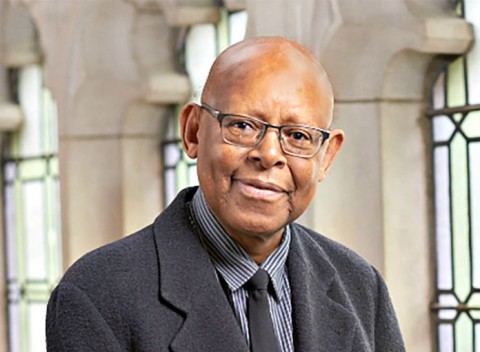Black liberation theologian James Cone dies at 79
In portraying Christ’s blackness, he upended the assumptions of a field dominated by white theologians and helped spawn other theories of liberation.

James H. Cone, one of the most powerful voices shaping liberation theology, died April 28 at age 79. According to the African Methodist Episcopal Church, in which Cone was ordained, he had cancer.
The author of such books as Black Theology and Black Power (1969), A Black Theology of Liberation (1970), and God of the Oppressed (1975), Cone joined the faculty of Union Theological Seminary in 1969.
“In so many ways, James Cone has been Union Theological Seminary for the past 50 years,” said Union president Serene Jones. “To say his death leaves a void is a staggering understatement. His prophetic voice, deep kindness, and fierce commitment to black liberation embodied not just the very best of our seminary, but of the theological field as a whole and of American prophetic thought and action.”
Read our latest issue or browse back issues.
Cone’s theology contrasted sharply with traditional theological approaches in that he articulated God’s identification with black people in the U.S. In portraying Christ’s blackness, he upended the assumptions of a field dominated by white theologians and helped spawn other theories of liberation.
In 1981, he contributed to the Christian Century’s How My Mind Has Changed series, writing about how his childhood in Arkansas prompted him to ask “What has the gospel of God to do with the extreme limits placed on the black community?”
His exploration of that question led him to the convictions that “the gospel was identical with the liberation of the poor from oppression” and that it “is necessary for the language of theology to be derived from the history and culture of black people.”
He held to those convictions as dialogue with women’s freedom movements and theologians in the global South expanded his understanding of “the complexity of human oppression,” he wrote. “I believe that my theological development will always be related to the historical projects of poor people as they struggle to build a new future not recognizable in the present world order.”
In the introduction of his most recent book, The Cross and the Lynching Tree, Cone noted that he was making connections many others had not.
“Despite the obvious similarities between Jesus’ death on a cross and the death of thousands of black men and women strung up to die on a lamppost or tree, relatively few people, apart from black poets, novelists, and other reality-seeing artists, have explored the symbolic connections,” he wrote.
Stephen G. Ray Jr., executive director of the Society for the Study of Black Religion, wrote in his Christian Century review of Cone’s book that what made it “a fitting capstone to his career is the way that he uses the creativity of African-American theological and cultural sources to transform a central category of the Christian faith so that it resists the co-option of the faith by the forces of lethal iniquity.”
Ray’s sense is that Cone’s work was an effort to address two problems: how to “bear witness to the power of life in the midst of a world awash in violence” and how to lift up the resurrection without being oblivious to suffering.
Cone’s book was honored with the 2018 Grawemeyer Award in Religion, a joint award from Louisville Presbyterian Theological Seminary and the University of Louisville. In April, he was elected as a fellow of the American Academy of Arts and Sciences, an honor earlier received by former president Barack Obama, Supreme Court justice Sonia Sotomayor, and author and educator Ta-Nehisi Coates.
The bishops of the AME Church said Cone “touched, trained, and molded generations of Ph.D. trained theologians and prophetic Christian servant leaders serving in pulpits and ministries around the world. Dr. Cone was truly a hero and shero maker.”
Cornel West, Harvard Divinity School professor of the practice of public philosophy, summed up the life of his friend and colleague: “James Cone was the theological giant and genius in our midst! He was the greatest liberation theologian to emerge in the American empire—and he never ever sold out.”
A version of this article, which was edited on May 9, appears in the print edition under the title “People: James H. Cone.”






